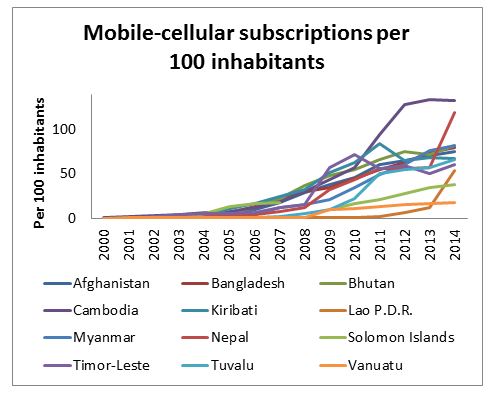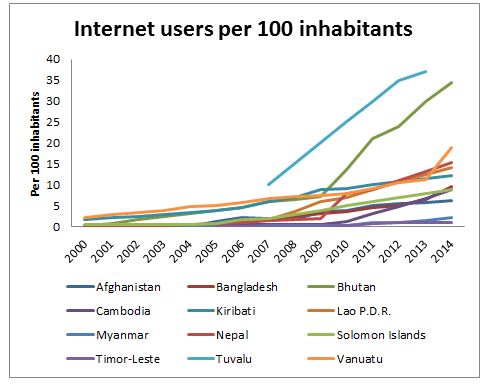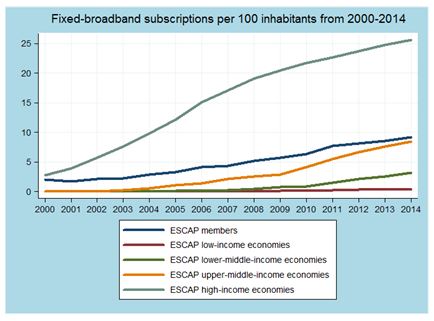
18 Mar, 2016
UNCTAD-ESCAP train government statisticians to upgrade technology data to facilitate growth and improve public well-being
Geneva, Switzerland, 18 March 2016, (UNCTAD/ESCAP News) – Benchmarking progress in building the information economy in Asia-Pacific least developed countries (LDCs) is crucial as governments in the region seek to reap the economic benefits of information and communications technologies (ICTs). The use of ICTs, such as mobile telephony and internet services, is increasing in such countries (chart 1).
But many national statistical organizations lag behind and very few LDCs collect data on the use of information and communications technology and e-commerce in the commercial sector. This makes it difficult for policy makers in these countries to design and assess relevant policies.
To support national statistical systems in this task, a training course attended by 24 participants from 11 LDCs in the Asia-Pacific region was held from 14–18 March 2016 at the United Nations Conference Center in Bangkok, Thailand.
The course was designed and delivered by UNCTAD in collaboration with the United Nations Economic and Social Commission for Asia and the Pacific (ESCAP).
The participating countries were: Afghanistan, Bangladesh, Bhutan, Cambodia, Kiribati, Lao Peoples’ Democratic Republic, Myanmar, Nepal, Timor-Leste, Tuvalu, and Vanuatu.
Looking at fixed-broadband subscriptions, the ESCAP region suffers greatly from the digital divide (chart 2). Overcoming such obstacles is an important component of the Asia-Pacific Information Superhighway initiative, which focuses on enhancing broadband infrastructure in the region.
The training course, made possible with financing from the Government of Sweden, contributed to international efforts to improve the availability of internationally comparable information and communications technologies statistics by the Partnership on Measuring Information and Communications Technology for Development, a global inter-agency undertaking of which ESCAP and UNCTAD are members.
 Chart 1. Mobile telephone subscriptions and Internet users in Asia-Pacific Least Developed Countries (LDCs) |
 Source: International Telecommunication Union (ITU). |
 Chart 2. Fixed-broadband subscriptions per 100 inhabitants of members of the United Nations Economic and Social Commission for Asia and the Pacific |
It also sought to contribute to the implementation of the outcome of the World Summit on the Information Society, which called for periodic evaluation based on appropriate indicators and benchmarking, and using an agreed methodology and statistics to monitor the information society.
Official information and communications technologies statistics are essential to track progress in developing the information economy and, importantly, achieving the Sustainable Development Goals, as highlighted at the most recent session of the United Nations Statistical Commission in New York on 8–11 March 2016.
Please visit the ESCAP website at http://www.unescap.org for further information.
Information economy indicators are available on the UNCTAD Statisitics Portal. For more information on UNCTAD’s work on the information economy and ICT for development, please refer to: http://unctad.org/ict4d
UNCTAD technical notes on ICT for Development are available at:
http://unctad.org/en/Pages/DTL/STI_and_ICTs/ICT4D-Technical-Notes.aspx



Liked this article? Share it!